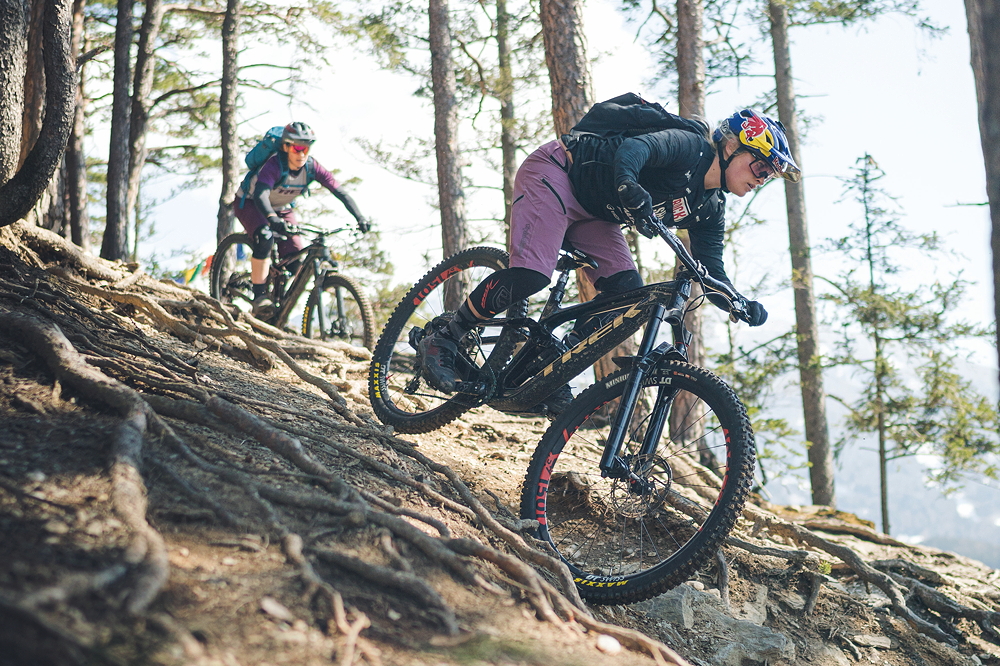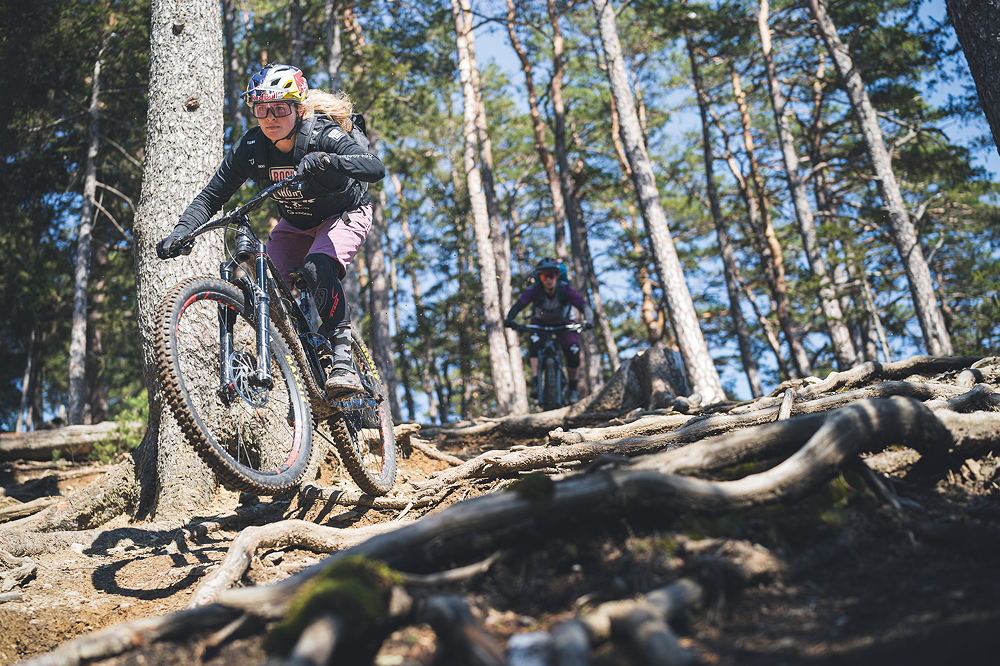Downhill prodigy Vali Höll is blazing a trail for female mountain bikers; former world champ Tracy Moseley gets the inside story.
Words: Tracy Moseley. Photos: Moritz Ablinger.
There is no hiding that mountain biking attracts more men than women, and especially when you look at the number of participants in races. Having boys and men to ride with has always been part of life for me ever since I started aged 14, and I attribute a lot of my success and skill from trying to aspire to be like them and keep up and copy them, and that is something I encourage all young female racers to do. But I feel we are seeing a shift.
Read more: Six women who’ve turned a love of mountain biking into a career

There are now so many more women mountain bikers out in the forests and on the trails and this is only going to continue to grow as more women see other women on bikes. The saying ‘you can’t be what you don’t see’ is one I heard recently, and it really stuck with me. More women riders means more visibility, which means more women will be encouraged to give mountain biking a try. In time more participation will lead to more women racing and so the snowball starts to gather momentum. It matters that we have female role models.
I also believe there is nothing better than an all-girls group ride. Being surrounded by like-minded, supportive women fosters the right kind of encouraging environment. They can also provide important opportunities for progression and skills tuition without being intimidating or overwhelming. The value of having other women to relate to, share experiences with and confide in cannot be underestimated.
Part of my role as a mentor for the Trek Factory Racing Team is to pass on my experience to young up-and-coming racers, offer advice when asked and be a listening post when needed. With women’s racing going from strength-to-strength, I sat down with one of downhill’s most prodigious talents – Vali Höll – to talk about her journey to the top.

Wunderkind Vali has talent to burn but a cool enough head not to burn out
Tracy: How did you get into biking and why did you end up racing downhill?
Vali: My parents always rode bikes, they always used to do weird long-distance cross- country stuff like the Trans-Alp marathon. But somehow they ended up flying to Whistler with me in 2004 when I was three years old. I didn’t really walk when I was younger, I always jumped on the balance bike. I was also a bit lazy, and I didn’t really enjoy pedalling, so the only way for me was going down.
T: You also did some ski-racing when you were young; did that come before biking, or were you already bike-racing as well at this point?
V: Ski-racing was kind of normal when I was growing up – everybody did it. I was kind of good at it, but the mentality is not as friendly as it is in biking. Then my dad found out there was something called the IXS Rookies Cup – a European Downhill Series for kids. He knew that I was really competitive so he took me to one. He said: “You’re going to race against the boys. Don’t expect to be any good, or even on the podium”. I ended up winning the race and beating all the boys.

Moseley’s a mum now so it’s only right she teaches the youth how to style it up
T: In more recent years you’ve had more female role models who have helped you. Who is that support network/crew now?
V: Angie Hohenwarter is a good friend of my parents. She has known me since I was seven and is a superstar in my eyes. She was a pro racer and I was always trying to follow her. I learned so much from her – not just riding. Things like how to talk to sponsors, how to prepare your coverage folder. Angie is now with me at all the World Cup races, taking care of me and supporting me. It’s cool to have a friend, but as my godmother she’s also very close to me. When Angie became my godmother, her present to me was a trip to Whistler.
T: Has your mum always been a good role model and encouraged you to ride? Has she always been a strong female presence in helping you?
V: My mum is actually so scared when I am riding. She loves riding as well, so we do love to ride together and we do lots of road biking. Every time I go racing she is super-scared, she can’t sleep for a week. My mum hates it now I’m racing elite – she only stays at the finish area.

T: The other person who has been an influence is Cécile Ravanel, who transitioned over from enduro to downhill a bit. How did you get to know her so well and how has she helped you in your career so far?
V: She came to the Croatia World Cup in 2018. It was her second downhill race, and my first season of racing downhill World Cups. Obviously I heard her name all the time and knew that she was a badass, but didn’t really know her well. From the first second, I liked her so much, it was so fun. We always trained and practised together. She was so good at the technical stuff and I helped her to get over the jumps. It was still serious, because we wanted to do well, but having fun was the priority.
This year I have started to work more closely with her, coming back from an injury. After breaking her leg and coming back, she knows how it is. My injury is nothing compared to hers, but she knows how it feels to go back and jump again. She’s also a really good coach, so she’s helping me out with all the specific on-the-bike training.
T: You seem quite level-headed. You’re not overly confident even though your results should indicate otherwise. I feel like you’re sensible in your approach, you just want to build your career step-by-step. Is that how you are approaching 2021, your first proper year as an elite?
V: For sure. I think nobody expected my racing would kick off like it did. Maybe others did, but I was the last person who thought my elite career would happen like that, winning Crankworx and doing well in Leogang on such a gnarly track. It’s going to be hard to replicate that. Maybe it was also luck involved as it is my home track. I don’t know. The track was just brutal but I think I did everything I could this off-season to kind of get back in shape, but this is going to be my first proper elite season this year, so I still have to learn a lot. I have a few more years in front of me to hopefully win some races.

When it comes to ice cream, Tracy’s not letting anyone beat her to the bottom
T: What have you learnt from your crash in Leogang? It’s the first big injury you’ve had. How did you react to that?
V: It’s funny because Leogang was the first weekend where I didn’t look at others. Normally I’m always checking other riders and always thinking too much about everyone else. Leogang was the first time I didn’t check out my rivals, and maybe it was a mistake. I didn’t know that I was the only one jumping (the big step-down). I felt so comfortable, and for me all the track above was way more gnarly than the jump itself. For me, the track was over when I got to the jump.
It was weird because I didn’t feel sorry for myself; I wasn’t really in a bad mood, I was just bored because I was at home. I actually enjoyed watching the races from home and seeing the other girls doing really really well – they all stepped up their game. Maybe it’s because I’m still young and still cheering for the others – it was more like being a proper fan watching the other girls race, but then at the same time I would be thinking, wow, maybe I could have been in the mix there too.
T: Looking forward, where do you want to be in five years’ time? I know Rachel Atherton has been a big idol of yours, do you ever think you could beat her string of wins or her World Cup tally? Have you got any aspirations for what you want to do in your career?
V: It’s hard to say, because in five years I’m still only going to be 24 years old. Rachel started to be so dominant at around ages 28-30, so it’s crazy to think about what’s possible because there is still so much time. So many years of racing the same tracks. I hope that it gets a bit more mixed up. I would like to do an EWS race and more Crankworx races. We see in other sports that people do more disciplines and they are really well-rounded bike riders; that is something I would like to try and be. I don’t think I’ll want to do cross-country racing though!
T: What piece of advice would you give to all those young girls that want to be the next Vali Höll?
V: Don’t be scared to ride with the boys and don’t be scared to beat them. It wasn’t fun for me when I was beating all the boys when I was 11. The girls didn’t talk to me and the boys didn’t talk to me. That was a weird few years for me, but you’re going to take so much positivity out of the experience. Boys really helped me to progress, actually, because there weren’t that many girls. But that’s changing already. Now there are so many young girls out there, so you can progress and learn with the girls. That wasn’t an option when I was young.




